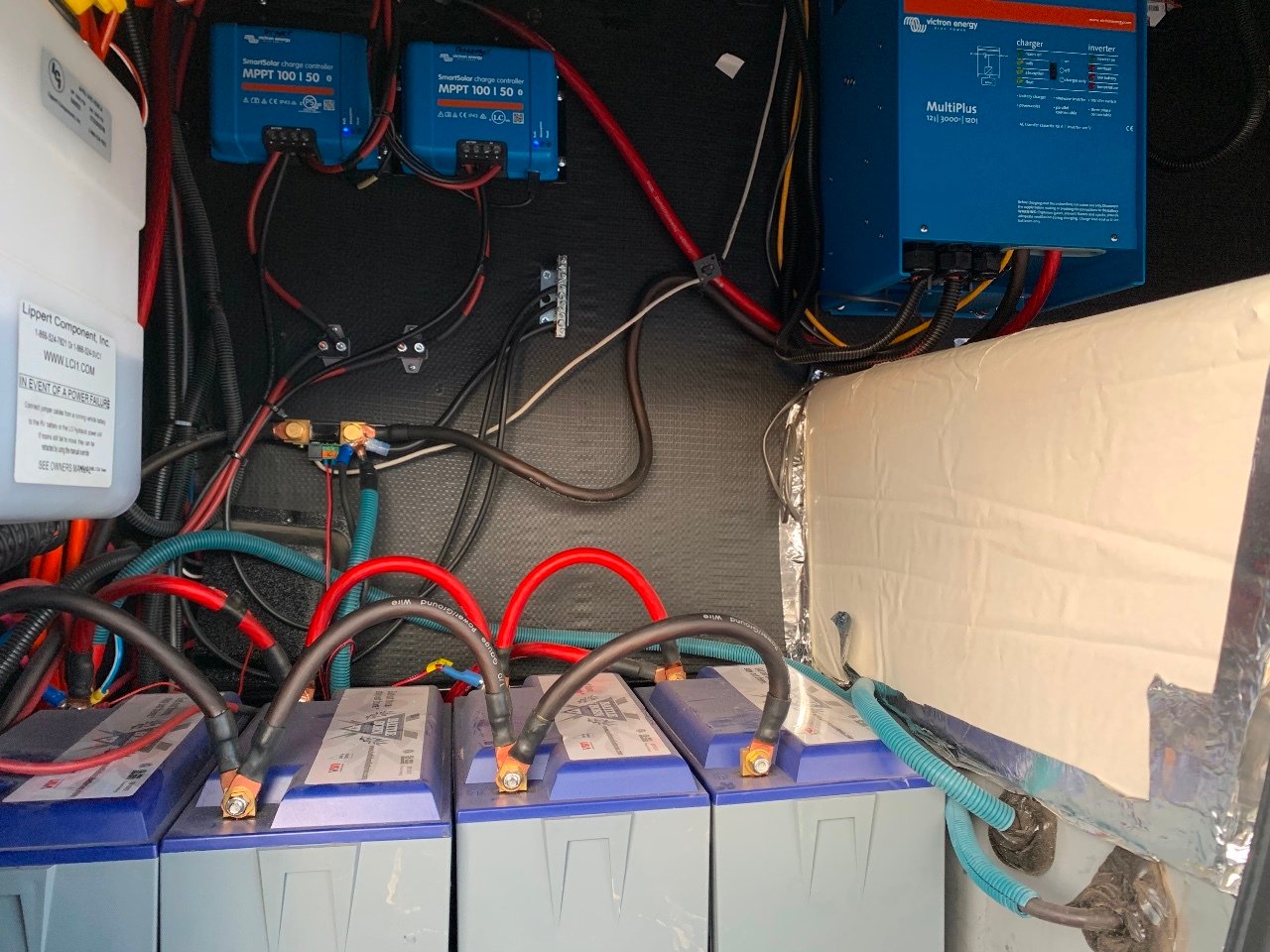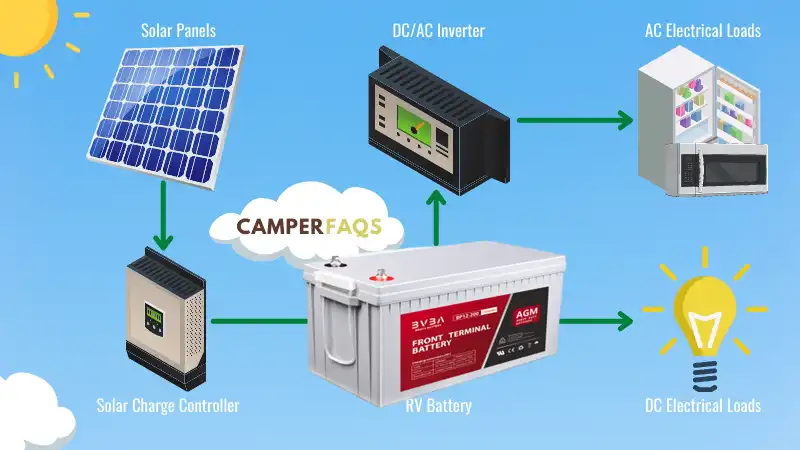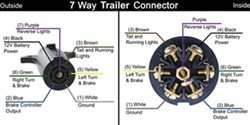How To Charge Camper Battery
When venturing into the great outdoors, a reliable camper battery is essential to power your appliances and keep your adventure comfortable. However, a dead battery can quickly turn a fun trip into a frustrating experience. Properly charging your camper battery is crucial to ensure it provides power when you need it most. In this article, we will guide you through the steps to charge your camper battery safely and efficiently, whether you're a seasoned RVer or a beginner. From understanding the different types of batteries to choosing the right charger, we've got you covered.
- How to Charge a Camper Battery: A Comprehensive Guide
- Does plugging in my camper charge the battery?
- How do you keep camper battery charged?
- Does a 7 pin trailer plug charge the battery?
- Does a 7 Pin Trailer Plug Charge the Battery?
- How do I know if my RV battery is charging?
- Frequently Asked Questions
How to Charge a Camper Battery: A Comprehensive Guide
Charging a camper battery is an essential task to ensure your RV or camper van is powered and ready for adventure. A camper battery, also known as a deep cycle battery, is designed to provide a steady flow of energy over a long period. Unlike a starter battery, which is used to start an engine, a camper battery is used to power appliances, lights, and other accessories in your camper van. Here's a step-by-step guide on how to charge a camper battery:
Understanding Camper Battery Types
Before we dive into charging, it's essential to understand the types of camper batteries available. The most common types are:
Flooded Lead-Acid Batteries: These batteries contain a liquid electrolyte solution and are the most affordable option.
AGM (Absorbed Glass Mat) Batteries: These batteries use a specialized glass mat to absorb the electrolyte solution, making them more durable and maintenance-free.
Lithium-Ion Batteries: These batteries are the most expensive option but offer superior performance, longer lifespan, and faster charging times.
Choosing the Right Charger
Selecting the correct charger for your camper battery is crucial. Consider the following factors:
Charger Type: There are three types of chargers: converter chargers, dedicated battery chargers, and solar chargers.
Charger Capacity: Choose a charger with a capacity that matches your battery's amp-hour rating.
Charger Features: Consider features like automatic shut-off, multi-stage charging, and built-in meters.
Preparing the Battery for Charging
Before charging, ensure your camper battery is prepared:
Check the Battery Water Level: For flooded lead-acid batteries, check the water level and top it off as needed.
Clean the Battery Terminals: Remove any corrosion or buildup from the terminals to ensure a good connection.
Disconnect the Battery: Disconnect the negative (black) cable to prevent any accidental short circuits.
Charging the Battery
Now it's time to charge your camper battery:
Connect the Charger: Connect the charger to the battery, following the manufacturer's instructions.
Set the Charger: Set the charger to the recommended voltage and ampere rating for your battery.
Monitor the Charging Process: Keep an eye on the charging process, and adjust the charger as needed.
Tips for Maintaining Your Camper Battery
To extend the lifespan of your camper battery:
Regularly Check the Battery Water Level
Avoid Deep Discharging
Keep the Battery Clean and Dry
Store the Battery in a Cool, Dry Place
| Charger Type | Advantages | Disadvantages |
|---|---|---|
| Converter Charger | Combines converter and charger functions, compact design | May not provide a full charge, can be slow |
| Dedicated Battery Charger | Faster charging times, more efficient | Bulkier design, more expensive |
| Solar Charger | Renewable energy source, low maintenance | Dependent on sunlight, slower charging times |
Does plugging in my camper charge the battery?

When you plug in your camper to a electrical hookup, it's natural to assume that the battery will charge. However, the answer is not a simple yes or no. It depends on the type of electrical system your camper is equipped with and how it's configured.
Understanding the Electrical System in Your Camper
To understand how plugging in your camper affects the battery, you need to know how the electrical system works. Most campers have a converter/charger that converts the 120-volt AC power from the electrical hookup to 12-volt DC power for the camper's systems. The converter/charger also has a built-in battery charger that can recharge the battery. However, not all converters/chargers are created equal, and some may not charge the battery at all.
Types of Converters/Chargers
There are three common types of converters/chargers found in campers:
- Simple Converter/Charger: This type of converter/charger only provides power to the camper's systems and does not charge the battery.
- Converter/Charger with Battery Charging: This type of converter/charger provides power to the camper's systems and also charges the battery. However, the charging rate may be limited, and it may not fully charge the battery.
- Multi-Stage Converter/Charger: This type of converter/charger provides power to the camper's systems and also charges the battery using a multi-stage charging process. This type of charger can fully charge the battery and is often found in higher-end campers.
How to Know if Your Camper's Battery is Charging
To determine if your camper's battery is charging when plugged in, you can:
- Check the converter/charger's manual or documentation to see if it has a built-in battery charger.
- Look for a battery charging indicator on the converter/charger or a separate battery monitor.
- Use a battery tester or multimeter to check the battery's voltage and charging rate.
Why Your Camper's Battery May Not be Charging
If your camper's battery is not charging when plugged in, it could be due to:
- A faulty or malfunctioning converter/charger.
- A loose or corroded connection between the converter/charger and the battery.
- The battery being deeply discharged and requiring a more advanced charging system.
Maintaining Your Camper's Battery
To keep your camper's battery in good condition, it's essential to:
- Regularly check the battery's voltage and charging rate.
- Avoid deep discharging the battery, as it can shorten its lifespan.
- Keep the battery terminals clean and secure to prevent corrosion and ensure good connections.
How do you keep camper battery charged?

Keeping a camper battery charged is crucial for a comfortable and enjoyable camping experience. A dead battery can leave you stranded without power for essential appliances, lights, and accessories. Here are some tips to help you keep your camper battery charged:
Maintaining the Battery
Regular maintenance is key to extending the life of your camper battery. Check the electrolyte level regularly, and top it off with distilled water as needed. Make sure the battery terminals are clean and free of corrosion. Use a wire brush to remove any corrosion and apply a layer of grease to prevent further corrosion.
Charging the Battery
There are several ways to charge your camper battery. Use a shore power cord to connect to a power source at a campsite. If you're boondocking, use a solar panel or a generator to charge your battery. You can also use a battery charger specifically designed for deep-cycle batteries.
Conserving Power
To minimize battery drain, turn off lights and appliances when not in use. Use energy-efficient LED bulbs and appliances to reduce power consumption. Unplug chargers for devices like laptops and phones when not in use to avoid standby power drain.
Monitoring Battery Health
Keep an eye on your battery's state of charge using a battery monitor or a multimeter. This will help you identify any issues early on and take corrective action. Check the battery's voltage regularly, and charge it when the voltage drops below 12.4V.
Deep Cycle Battery Care
Deep-cycle batteries, like those used in campers, have specific care requirements. Avoid deep discharging by keeping the battery charged above 50% capacity. Avoid overcharging, which can damage the battery. Use a deep cycle battery charger specifically designed for these types of batteries.
- Charge the battery regularly to prevent sulfation.
- Avoid extreme temperatures, which can affect battery performance.
- Use a battery maintainer to keep the battery charged when not in use.
Does a 7 pin trailer plug charge the battery?

Does a 7 Pin Trailer Plug Charge the Battery?
The 7-pin trailer plug is a common connector used for towing trailers, but does it charge the battery? The answer is yes, it can charge the battery, but only under certain conditions.
The 7-pin trailer plug has a dedicated pin for charging the trailer's battery, which is usually the center pin. This pin is connected to the tow vehicle's battery charging system, allowing it to charge the trailer's battery while towing. However, this charging function only works when the tow vehicle's engine is running and the electrical system is active.
How Does the 7-Pin Trailer Plug Charge the Battery?
The 7-pin trailer plug charges the battery through the following process:
- The center pin of the 7-pin trailer plug is connected to the tow vehicle's battery charging system.
- When the tow vehicle's engine is running, the alternator generates electricity, which is then sent to the battery charging system.
- The battery charging system distributes the electricity to the trailer's battery through the center pin of the 7-pin trailer plug.
- The trailer's battery is charged, allowing it to power the trailer's electrical systems, such as lights and brakes.
What Are the Benefits of Charging the Trailer Battery?
Charging the trailer battery through the 7-pin trailer plug has several benefits:
- Extended Battery Life: Regular charging helps to prolong the life of the trailer's battery.
- Improved Performance: A fully charged battery ensures that the trailer's electrical systems function properly.
- Reduced Downtime: A dead battery can cause delays and inconvenience; charging the battery while towing reduces the risk of downtime.
What Are the Limitations of Charging the Trailer Battery?
While the 7-pin trailer plug can charge the trailer battery, there are some limitations to consider:
- Charging Capacity: The charging capacity of the tow vehicle's battery charging system may not be sufficient to fully charge the trailer's battery.
- Trailer Battery Size: Larger trailer batteries may require more power to charge, which the 7-pin trailer plug may not be able to provide.
- Towing Distance: The charging process may not be sufficient for long-distance towing, requiring additional charging methods.
What Are the Alternatives to Charging the Trailer Battery?
If the 7-pin trailer plug is not sufficient to charge the trailer battery, there are alternative methods to consider:
- Solar Charging: Solar panels can be installed on the trailer to charge the battery.
- Shore Power Charging: Plugging the trailer into a shore power outlet can charge the battery.
- Portable Generators: Portable generators can be used to charge the trailer battery when shore power is not available.
Best Practices for Charging the Trailer Battery
To ensure safe and efficient charging of the trailer battery, follow these best practices:
- Regularly Check the Battery Condition: Monitor the battery's state of charge and condition to ensure it's functioning properly.
- Avoid Overcharging: Avoid overcharging the battery, as it can cause damage and reduce its lifespan.
- Use the Correct Charging Methods: Use the correct charging methods and equipment to avoid damaging the battery or electrical systems.
How do I know if my RV battery is charging?

To determine if your RV battery is charging, you need to monitor its state of charge and check for signs of charging activity. Here are some ways to do it:
Voltage Check
Check the voltage of your RV battery using a multimeter. A fully charged battery should read around 12.6 volts for a 12-volt system. If the voltage is lower than this, it may indicate that the battery is not charging.
Charging Indicator
Look for a charging indicator on your RV's electrical panel or battery monitor. This indicator may be a light, gauge, or display that shows the charging status of your battery.
Amperage Check
Measure the amperage flowing into your RV battery using a multimeter or an ammeter. A charging battery will show a positive amperage reading, indicating that power is flowing into the battery.
How to Check RV Battery Charging with a Multimeter
To check RV battery charging with a multimeter, follow these steps:
- Set your multimeter to DC voltage mode (usually denoted by a V symbol with a straight line above it).
- Touch the positive lead (usually red) to the positive terminal of the battery.
- Touch the negative lead (usually black) to the negative terminal of the battery.
- Take a reading of the voltage on the multimeter display.
- Compare the reading to the recommended voltage for your RV battery.
Common Signs of RV Battery Charging Issues
If your RV battery is not charging, you may notice some common signs, including:
- Battery drain: The battery voltage drops rapidly, even when the RV is not in use.
- Slow engine crank: The engine takes longer than usual to start.
- Dim lights: The interior lights of your RV are dimmer than usual.
- Appliance malfunction: Appliances like the fridge or air conditioner are not functioning properly.
- Battery swelling: The battery is swollen or bloated, indicating overcharging.
Causes of RV Battery Charging Issues
There are several reasons why your RV battery may not be charging, including:
- Alternator failure: The alternator is not functioning properly, preventing the battery from charging.
- Bad battery connections: Corrosion or loose connections can prevent the battery from charging.
- Faulty charging system: The charging system, including the converter or inverter, is malfunctioning.
- Deep discharge: The battery has been deeply discharged, causing damage to the cells.
- Aging battery: The battery is old and no longer holds a charge.
Tips for Maintaining Your RV Battery
To keep your RV battery in good condition, follow these tips:
- Monitor the battery voltage: Regularly check the battery voltage to ensure it's within the recommended range.
- Avoid deep discharge: Avoid letting the battery drop below 50% charge to prevent damage.
- Keep the battery clean: Clean the terminals and connections to prevent corrosion.
- Avoid overcharging: Monitor the charging system to prevent overcharging, which can cause damage to the battery.
- Store the battery properly: Store the battery in a cool, dry place when not in use, and charge it every 3-6 months.
When to Replace Your RV Battery
If your RV battery is not holding a charge or is showing signs of wear, it may be time to replace it. Consider replacing the battery if:
- Age: The battery is more than 3-5 years old.
- Cycle life: The battery has exceeded its recommended cycle life.
- Capacity: The battery is no longer holding a full charge.
- Physical condition: The battery is damaged, corroded, or swollen.
- Performance: The battery is not performing as expected, causing issues with your RV's electrical system.
Frequently Asked Questions
How Often Should I Charge My Camper Battery?
It's essential to charge your camper battery regularly to maintain its health and extend its lifespan. The frequency of charging depends on several factors, including the type of battery, usage, and storage conditions. As a general rule, you should charge your camper battery every 3-6 months if it's been stored in a cool, dry place. However, if you're using your camper frequently, you may need to charge the battery every 1-2 months. Deep cycle batteries, which are designed for heavy-duty use, may require more frequent charging. It's also important to monitor the battery's state of charge and charge it when the voltage drops to around 50%. Remember to always follow the manufacturer's guidelines for charging and maintenance.
Can I Charge My Camper Battery with a Solar Panel?
Yes, you can charge your camper battery using a solar panel. In fact, solar charging is a great way to keep your battery topped up while you're on the road. Solar panels can be mounted on the roof of your camper or set up as a portable system. To charge your battery with a solar panel, you'll need a charge controller, which regulates the flow of energy from the panel to the battery. Make sure to choose a solar panel and charge controller that are compatible with your battery type and size. It's also important to consider the size of your solar panel and the amount of energy it can generate. A larger panel may be needed to charge a larger battery.
How Long Does It Take to Charge a Camper Battery?
The time it takes to charge a camper battery depends on several factors, including the type and size of the battery, the charging method, and the capacity of the charger. Generally, a deep cycle battery can take anywhere from 2-12 hours to fully charge, depending on the charger's amperage rating. A higher amperage charger will charge the battery faster, but it may also increase the risk of overcharging. Trickle charging, on the other hand, is a slower and more gentle charging method that can take up to 24 hours to fully charge the battery. It's essential to monitor the battery's state of charge and adjust the charging time accordingly.
What Are the Signs of a Dead Camper Battery?
A dead camper battery can be a frustrating experience, especially when you're on the road. However, there are some signs to look out for to avoid getting stranded. Weak or dim lights are often the first indication of a dying battery. If your lights are dimmer than usual, it may be a sign that the battery is losing its charge. Slow engine crank is another sign of a weak battery. If your engine takes longer than usual to start, it could be a sign that the battery is struggling to hold a charge. Swollen or bloated battery is a clear indication of a dead battery. If you notice any of these signs, it's essential to have your battery tested and replaced if necessary. Remember to always follow proper safety precautions when working with batteries.


